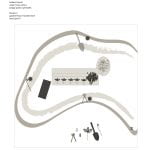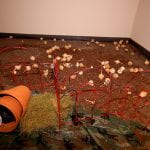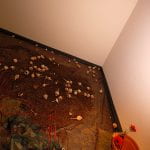the birds the bees the flowers and the seeds
In my recent piece, the birds the bees the flowers and the seeds, a series of spoken fictional “scores” fill an installation space in the form of rich reverberant audio, piped through an six-channel audio interface, with speakers that double as flower pots. Each of the scores begins with some version of the statement, “It is the future, you live in a future garden. You live in a beautiful garden of the future.” These scores narrate some kind of scenario, where, although the garden is very beautiful and you have everything you need, you also miss certain people who are not in the garden, people you love and desire. Or you might need to select new mates to further your species. All narrative scores deal with consumption and desire. After outlining some such theme, the narratives then encourage the visitor to engage the garden in some way; this, they are told, will ensure contact with a lost love, or the selection of a new mate. Visitors are told that the future garden they find themselves in is a communication technology, or memory device. Everything in this future garden has a double symbolism: poppy pods look like grenades, bullets are seeds, the planter is an ammo case, etc. When visitors plant “seeds” to retrieve a memory, as the score instructs, audio news clips relating to the current US war and occupation in Iraq and Afghanistan play back through speakers hidden in flowerpots. Most, if not all of the audio clips begin with an Iraqi speaking in Arabic and often narrating something to do with the current war’s effect on landscape, gardens, their families etc. Desires narrated in the future garden, then, collide with true stories of death and destruction outside the garden, creating deeply uncomfortable associations within the narratives, alluding to the positions and movements of bodies in wired spaces of privilege and victims of violence. At its most disturbing, the piece asks to what degree the garden — perhaps not metaphorical but very literal — is nourished by this violence. The allegory of the garden is both literal and metaphorical. It operates on the premise that the U.S. is literally a garden, a cultivated space. But also it works to illustrate how this garden requires the blood of others to flourish. Finally, the garden seeks to show how both war and gardens might cultivate us to further their own evolution.



